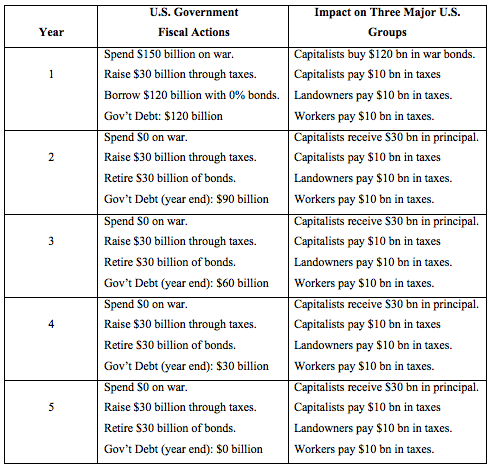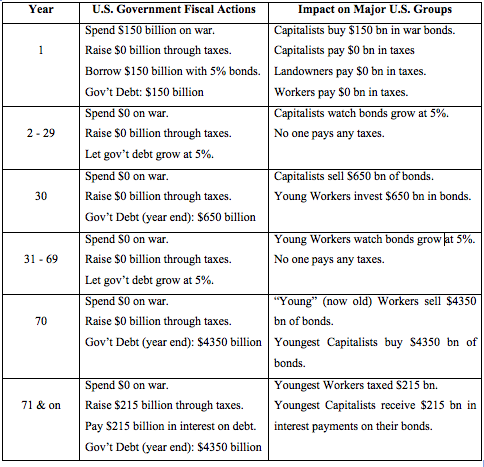Government Debt and Future Generations
By Robert P. Murphy

Critics of government budget deficits often argue that deficits are irresponsible and cowardly because the present generation is foisting the bill onto future generations, many of whom have no say in the political decision. This perspective resonates with the man on the street, but many professional economists—such as Paul Krugman and Dean Baker—believe that such thinking is completely fallacious because it confuses an individual household with the economy as a whole.1 According to these economists, today’s government spending is “paid for” by the present generation, period, and any talk of burdening our grandchildren is nonsense.
For more on who bears the burden of public debt, see the EconTalk podcast episode Boudreaux on Public Debt.
However, some economists—notably James Buchanan and those following his lead—have challenged this dismissal.2 They argue that when we account for the fact that generations overlap, there really is a legitimate sense in which government debt allows people today to enjoy higher government spending that is partially paid for by reducing the standard of living of taxpayers who have not even been born. In this article, I lay out the respective positions with a numerical example involving a hypothetical war. I use the example of war because that has a been a traditional cause of government debt. But the same analysis applies whether the government debt is to finance war or to finance anything else that government spends money on. I also show that this dispute is not simply an ideological one: I contrast Buchanan’s view with that of Ludwig von Mises, a champion of the free market and no apologist for government budget deficits. Even Mises, in his writings about financing war, overlooked the subtleties that Buchanan (decades later) would emphasize.
Ludwig von Mises on War Finance
In a speech delivered in the summer of 1918 in Vienna,3 Mises—a proud member of the Austro-Hungarian Empire—explained that the burden of the “Great War” fell on the present generation:
Some people claim that financing the war by state loans is tantamount to passing on the costs of war from the present generation to future generations. It is sometimes said that this transfer is fair because war is waged not only in the interest of the present generation, but also for that of our children and grandchildren. Nothing could be further from the truth. War can be waged only out of currently available goods. One can fight only with the weapons on hand; all military needs must be met out of existing wealth. It is the present generation that is waging war from an economic point of view, and it is this generation that must bear all the material costs of the war. Future generations are affected only insofar as they are our heirs. We will be leaving less behind for them than if war had not happened. This is an unavoidable fact, whether the state finances the war by indebtedness or by any other means. [Mises [1918] 2012, pp. 221-222, emphasis added.]
Mises is undeniably correct: If the government wants to produce artillery shells and tanks in 1918, then this output must come at the expense of potential goods and services that can no longer be produced in 1918. Issuing government war bonds does not give politicians access to time machines, by which they can siphon resources out of the hands of future generations to boost wartime production. Yet the conclusion Mises draws from this correct observation is too strong. Financing a war through government bonds can allow the present generation to “pass on” the cost in an important sense, as I will show.
The Impact of, and Rationale for, War Bonds
At this point, let me reassure the reader that everyone agrees that war bonds (and government debt more generally) have an impact on specific groups. As Paul Krugman acknowledged all along in this debate, if the government runs up (say) an extra $1 trillion in debt this year, such that Americans in 100 years grow up in a country with a national debt that is $1 trillion higher, then the federal government at that time will have to tax a certain group of Americans in order to make interest payments to a (possibly different) group of Americans who inherited the Treasury securities.
Even so, Krugman argues, it would be silly to think that our deficits today are somehow making Americans in 100 years collectively poorer. On the contrary, the government at that time will simply take (say) $30 billion annually from some Americans and transfer it to other Americans, as interest on the higher national debt.4 Such transfer payments have various consequences, but (Krugman continues) this isn’t at all what the man on the street has in mind when he complains that today’s deficits pass the buck to unborn citizens.
Such logic seems airtight. I myself endorsed a version of it earlier in my career.5 But it raises an obvious question: If paying for a war through deficit finance does not in any way allow the present generation to defer the true costs of the war to future generations, then why do governments so often resort to deficit financing? Surely today’s taxpayers would balk at covering a massive war expense out of current taxes, so doesn’t it have to be the case that the issue of war bonds relieves the pressure on the citizens who are experiencing the war?
Mises, in his 1918 lecture, gives us an answer: The reason that the belligerents in major wars typically resort to deficit finance is not to allow the present generation to foist the costs onto unborn grandchildren. Rather, Mises argues, it is simply to allow for a more equitable distribution of the war burden among the present generation.
Specifically, Mises argues that if the government were to levy the full cost of the war on the citizens in the form of current taxes, then only the owners of liquid capital would be able to easily pay their tax bill. Owners of real estate and other illiquid property, as well as the workers, would have to take out loans in the private sector in order to make their tax payments. Thus, Mises argues, when the government instead issues bonds to finance the war—which will be serviced out of future tax payments—it is simply cutting out the middleman, and effectively borrows on behalf of the citizens who would otherwise have to seek out private credit to pay their share of the war expense. In Mises’ view, then, there is a definite rationale for financing an expensive war through bonds, but it has nothing to do with burdening future generations. Rather, deficit finance is simply a way of distributing the burden on the present generation more equitably, to avoid forcing some citizens to borrow at high interest rates from those with liquid capital.
In the next section, I illustrate Mises’ argument with a simple numerical example. As we will see, his argument opens the door to exactly the type of considerations that James Buchanan and others would (decades later) bring up. Just as today’s capitalists aren’t fully shouldering the burden of the war, we can see that, in the exact same sense, the entire group of people alive today isn’t fully shouldering the burden, either.
First consider War Scenario A:
How would Mises (or Paul Krugman for that matter) describe what happened in my hypothetical War Scenario A? I believe he would say that there was a certain sense in which the capitalists in Year 1 clearly “paid for” the war, but there was also a legitimate sense in which the entire generation of Americans alive during the war paid for it. The landowners and workers wouldn’t have had the means to pay their entire “fair share” during Year 1, and so the government borrowed from the capitalists on their behalf, as it were. Then, over the next four years, the debt was gradually paid off. In this way, the burden of the war effort was equally distributed among the three main groups, and the deficit finance was merely a mechanism to effectively allow the workers and landowners to spread the cost out over five years, rather than paying the full lump sum upfront in Year 1.
If Mises (and Paul Krugman) would be satisfied with the description I just gave, then the debate would be over. Relying on James Buchanan’s arguments, we can construct War Scenario B and show that, in the exact same sense, the cost of the war in Year 1 can be spread out decades into the future, onto the shoulders of taxpayers who were not even alive during the war.
War Scenario B is admittedly much more complex. In Year 1, the Capitalists finance the entire war expenditure through loans to the government. No one is taxed. The years roll on without any taxation, while the original Capitalists watch the market value of their bonds increase at an annual rate of five percent.
In Year 30, the original Capitalists want to start enjoying their golden years. They sell off their Treasury holdings to a new batch of workers, who weren’t even alive during the war. The government is still not involved, though its accountants can say that the outstanding public debt (which they keep rolling over as the bonds mature) is now at $650 billion. (Note that I have rounded for simplicity; the figures are not exact.)
Another forty years go by. In Year 70, the people we used to call Young Workers are now ready to retire, so they sell their bonds to yet another generation—the grandchildren of the people who were alive during the war in Year 1. These Youngest Capitalists then assume legal ownership of what is now $4350 billion in Treasury securities.
At this point, the government decides that it shouldn’t let the debt grow exponentially forever. It levies annual taxes just sufficient to cover the interest on the outstanding debt. Furthermore, it levies the taxes only on the workers. Thus, from Year 71 onward, the government taxes the Youngest Workers $215 billion from their wages and salaries in order to make the interest payments due on the bonds owned by the Youngest Capitalists, so that the principal of the outstanding government debt stays constant.
Now, how would Paul Krugman evaluate this new scenario? He would be tempted to argue that the existence of the large government debt of $4350 billion in Year 70 couldn’t possibly impose a burden on the grandchildren as a whole. Yes, the Youngest Workers are burdened with the $215 billion in taxes necessary to pay the interest on the outstanding government debt, but the government is giving that money right back to the Youngest Capitalists. In line with his commentary in the New York Times, Krugman would look at that outcome and agree that there was redistribution within the generation, but he would deny that the grandchildren collectively were made poorer by the large government debt. It would be foolish, Krugman would argue, to say that somehow the grandchildren in Year 70 onward are “paying for” the war expenditure made back in Year 1, when they weren’t even alive.
If we go that route, then we are forced to say that the war expense in Year 1 was paid for entirely by the Capitalists in Year 1. Yet this leads to a contradiction. Back in War Scenario A, it was crystal clear that the Misesian worldview—which I also think Krugman would have endorsed—said that the Capitalists did not really shoulder the war effort entirely because they knew they would be paid back out of future taxes for the loans they advanced.
It is undeniable that governments find it easier to finance a war (or other large expenditure) through the issue of bonds rather than through direct taxation. Whatever arguments we use to explain this phenomenon, it necessarily shows that there is a very legitimate sense in which the expenditure is not really “paid for” by the capitalists who happen to buy the bonds at the moment of the expenditure. Yet once we open that door, there is no reason that the expenditure must be shouldered by the present generation. Through the phenomenon of overlapping generations, the debt can be passed down through the decades.
“The grandchildren had to pay their elders $4350 billion for the outstanding Treasury bonds.”
Finally, note the crucial ambiguity in saying that future generations “inherit” the government debt. Yes, if an older generation literally bequeaths Treasury securities to their heirs, then the analysis of Krugman et al. sounds more reasonable. But that’s not what happened, for example, in War Scenario B. There, the grandchildren had to pay their elders $4350 billion for the outstanding Treasury bonds. It was rational for each individual Youngest Capitalist to do so because the government was going to start taxing and making interest payments to the holders of those Treasuries. This is exactly what happens in the real world: we have all grown up in an environment with a large government debt, and the government taxes us so that it can make interest payments. Then—if we so desire—we can enter the market and buy Treasuries. Yet none of us is free of the existing debt and the taxes levied to service it.
Conclusion
In one sense, it is obvious that a major government expenditure is “paid for” out of current resources. Politicians can’t use a time machine to literally take goods away from future generations.
However, once we analyze why governments typically resort to deficit finance, we see that there is another sense—also legitimate—in which future taxpayers can help today’s capitalists finance today’s government expenditures. Although the mechanisms are more subtle than the average person realizes, the man on the street is largely correct when he worries that large government deficits are irresponsibly forcing our grandkids to deal with our profligacy.
See for example Dean Baker, “David Brooks Is Projecting His Self Indulgence Again,”Beat the Press blog post, December 27, 2011; and Paul Krugman, “Debt Is Money We Mostly Owe to Ourselves”, New York Times blog post, December 28, 2011.
A classic essay in this literature is James Buchanan, “Confessions of a Burden Monger,”Journal of Political Economy, Vol. 72, No. 5, October 1964. See also Don Boudreaux, “Let’s Not Talk Past Each Other On the Burden-of-Public-Debt Issue,”Cafe Hayek blog post, January 5, 2012; and Nick Rowe, “Debt is too a burden on our children”, Worthwhile Canadian Initiative blog post, December 28, 2011.
Mises’ lecture is Chapter 12, “On Paying for the Costs of War and War Loans,” in Richard Ebeling (ed.), Selected Writings of Ludwig von Mises, Volume 1: Monetary and Economic Policy Problems Before, During, and After the Great War (Indianapolis: Liberty Fund, 2012).
Throughout his commentary on this issue, Krugman has always acknowledged that if foreigners lend the U.S. government money to finance today’s deficits, then there is a legitimate sense in which today’s profligacy comes at the expense of future American taxpayers (who must make interest payments to foreigners to service the higher debt). However, Krugman argues that empirically most of the debt we “owe to ourselves” and further that the usual man on the street critic doesn’t have such complexities in mind. The argument that government debt doesn’t represent a burden on the country as a whole insofar as the citizens “owe it to themselves” was articulated early on by Abba Lerner in “The Burden of the National Debt,” in Lloyd A. Metzler et al. (eds.), Income, Employment and Public Policy, Essays in Honour of Alvin Hanson (New York: W. W. Norton, 1948), pp. 255-275.
Specifically, in my textbook Lessons for the Young Economist (Mises Institute, 2010), I listed several problems with government budget deficits, but I argued that the interest payments on the debt did not directly impose a burden on future generations, because the government securities themselves would be passed along to future heirs as well.


